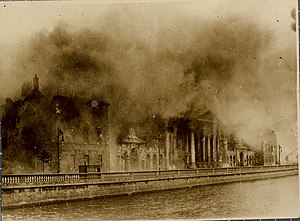| Battle of Dublin | |||||||
|---|---|---|---|---|---|---|---|
| Part of the Irish Civil War | |||||||
 The Four Courts ablaze during the battle, 30 June 1922 | |||||||
| |||||||
| Belligerents | |||||||
|
Anti-Treaty IRA Irish Citizen Army | |||||||
| Commanders and leaders | |||||||
|
Michael Collins Paddy Daly Tom Ennis | ||||||
| Strength | |||||||
|
200 troops in Four Courts, ~500 more in city | 4,000 troops | ||||||
| Casualties and losses | |||||||
|
At least 15 killed Unknown number wounded Over 450 captured[1] |
At least 29 killed 150 wounded[1] | ||||||
| At least 35 civilians killed, over 100 wounded[1] | |||||||
The Battle of Dublin was a week of street battles in Dublin from 28 June to 5 July 1922 that marked the beginning of the Irish Civil War. Six months after the Anglo-Irish Treaty ended the recent Irish War of Independence, it was fought between the forces of the new Provisional Government and a section of the Irish Republican Army (IRA) that opposed the Treaty.
The Irish Citizen Army also became involved in the battle, having supported the anti-Treaty IRA in the O'Connell Street area. The fighting began with an assault by Provisional Government forces on the Four Courts building, and ended in a decisive victory for the Provisional Government.
- ^ a b c Dorney 2012.